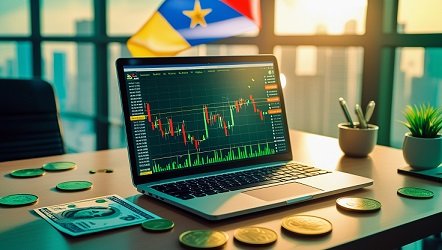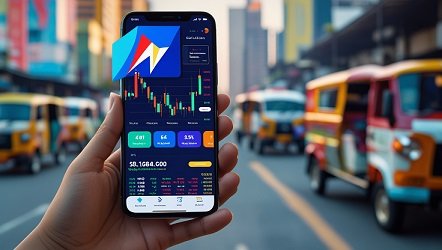Is forex trading your ticket to financial freedom or a legal minefield? 🤔 For many Filipinos, the allure of forex trading is undeniable. The potential for quick profits and the excitement of global markets have captured the imagination of countless aspiring traders. But before you dive in, there’s a crucial question you need to answer: Is forex trading legal in the Philippines?
The world of forex can be a complex maze of regulations, licenses, and restrictions. Navigating this landscape without proper knowledge could lead to severe consequences, including legal troubles and financial losses. But fear not! We’re here to shed light on the legal status of forex trading in the Philippines, guiding you through the intricate web of rules and regulations.
In this comprehensive guide, we’ll explore everything from registration requirements and trading limits to taxation and consumer protection measures. We’ll also delve into the challenges and opportunities that await Filipino forex traders. So, whether you’re a curious beginner or an experienced trader looking to stay compliant, buckle up as we embark on this enlightening journey through the legal landscape of forex trading in the Philippines. 💼💱
Best Trading App in The Philippines for Your Investing Journey

Legal Status of Forex Trading in the Philippines
Overview of forex trading legality
Forex trading is legal in the Philippines, with the government recognizing it as a legitimate financial activity. The country has established a regulatory framework to ensure fair practices and protect investors. However, traders must adhere to specific guidelines and regulations set by the authorities.
Regulatory bodies overseeing forex activities
Two primary regulatory bodies oversee forex trading in the Philippines:
These organizations work together to maintain the integrity of the forex market and protect traders’ interests. Here’s a comparison of their roles:
| Regulatory Body | Primary Responsibilities |
|---|---|
| BSP | – Supervises banks and financial institutions<br>- Monitors foreign exchange transactions<br>- Sets monetary policies |
| SEC | – Regulates securities and investment instruments<br>- Oversees forex brokers and dealers<br>- Enforces compliance with trading rules |
Key laws and regulations governing forex trading
The Philippine forex trading landscape is governed by several important laws and regulations:
- Republic Act No. 8799 (Securities Regulation Code)
- Republic Act No. 7653 (New Central Bank Act)
- BSP Circular No. 1024 (Guidelines on Derivatives Activities of Banks)
These regulations aim to:
- Prevent fraud and market manipulation
- Ensure transparency in forex transactions
- Protect retail investors from excessive risk
- Maintain the stability of the financial system
Now that we’ve covered the legal framework, let’s explore the specific registration and licensing requirements for forex traders and brokers in the Philippines.

Registration and Licensing Requirements
Steps to become a legal forex trader
To become a legal forex trader in the Philippines, individuals must follow a structured process:
- Educational preparation
- Account registration with a licensed broker
- Document submission
- Compliance training
- Initial deposit
Necessary licenses and permits
Forex traders in the Philippines don’t need personal licenses, but brokers require specific permits:
| License/Permit | Issuing Authority | Purpose |
|---|---|---|
| Secondary License | Securities and Exchange Commission (SEC) | Authorizes forex trading operations |
| Certificate of Authority | Bangko Sentral ng Pilipinas (BSP) | Allows foreign exchange dealings |
Compliance with anti-money laundering regulations
Forex traders must adhere to strict anti-money laundering (AML) guidelines:
- Provide proof of identity and address
- Declare source of funds
- Report suspicious transactions
- Maintain accurate transaction records
Brokers are required to implement Know Your Customer (KYC) procedures and conduct regular audits to ensure compliance. These measures help maintain the integrity of the Philippine forex market and protect traders from fraudulent activities.
Now that we’ve covered the registration and licensing requirements, let’s explore the trading limits and restrictions imposed on forex traders in the Philippines.

Trading Limits and Restrictions
Maximum leverage allowed
The Bangko Sentral ng Pilipinas (BSP) has set specific leverage limits for forex trading in the Philippines. The maximum leverage allowed is 1:50, which means traders can control positions up to 50 times their invested capital. This regulation aims to protect traders from excessive risk while still providing opportunities for profit.
| Leverage Ratio | Explanation |
|---|---|
| 1:50 | Maximum allowed leverage |
| 1:30 | Recommended for experienced traders |
| 1:10 | Suitable for beginners |
Minimum capital requirements
To engage in forex trading in the Philippines, traders must meet certain minimum capital requirements:
- Individual traders: PHP 500,000 (approximately $10,000 USD)
- Corporate entities: PHP 1,000,000 (approximately $20,000 USD)
These requirements help ensure that traders have sufficient funds to withstand potential losses and maintain market stability.
Restrictions on currency pairs
The BSP allows trading in a wide range of currency pairs, but some restrictions apply:
- Major pairs (e.g., USD/EUR, GBP/USD) are freely tradable
- Exotic pairs involving the Philippine Peso (PHP) may have additional regulations
- Some emerging market currencies may require special permissions
Limits on daily trading volume
To prevent market manipulation and excessive speculation, the BSP imposes limits on daily trading volumes:
- Individual traders: Maximum of $100,000 per day
- Corporate entities: Maximum of $500,000 per day
- Banks and financial institutions: Subject to higher limits based on their capitalization
These trading limits and restrictions are designed to maintain a stable and secure forex trading environment in the Philippines. Traders should always stay informed about current regulations to ensure compliance and minimize risks.

Taxation of Forex Trading Profits
Income tax implications for forex traders
Forex trading profits in the Philippines are subject to income tax, falling under the category of capital gains. Individual traders are required to report their forex trading income on their annual tax returns. The tax rate depends on the trader’s overall income bracket, ranging from 0% to 35% as of 2023. For example:
| Income Bracket (PHP) | Tax Rate |
|---|---|
| Up to 250,000 | 0% |
| 250,001 – 400,000 | 15% |
| 400,001 – 800,000 | 20% |
| 800,001 – 2,000,000 | 25% |
| 2,000,001 – 8,000,000 | 30% |
| Over 8,000,000 | 35% |
It’s crucial for traders to keep accurate records of their trades and profits to ensure proper tax compliance.
Reporting requirements for forex earnings
Forex traders in the Philippines must report their earnings to the Bureau of Internal Revenue (BIR). This involves:
- Maintaining detailed trading logs
- Calculating net profits (total gains minus losses and expenses)
- Including forex income on the annual Income Tax Return (ITR)
- Submitting supporting documents if requested by the BIR
Traders should be prepared to provide evidence of their trading activities, including account statements and transaction histories.
Tax deductions and exemptions
While forex trading profits are taxable, traders can potentially reduce their tax liability through:
- Deducting trading-related expenses (e.g., internet costs, trading software subscriptions)
- Offsetting losses against gains
- Claiming home office deductions if trading from home
It’s important to note that tax laws can change, and individual circumstances may vary. Traders are advised to consult with a tax professional to ensure compliance and optimize their tax strategy. Now, let’s explore the consumer protection measures in place for forex traders in the Philippines.
Consumer Protection Measures
Safeguards against fraudulent forex schemes
The Philippines has implemented several measures to protect consumers from fraudulent forex schemes:
- Regulatory oversight by the Securities and Exchange Commission (SEC)
- Mandatory registration of forex brokers
- Regular audits of forex trading platforms
- Strict penalties for non-compliance
To help traders identify legitimate forex brokers, the SEC maintains a public list of registered entities:
| Registration Status | Description |
|---|---|
| Registered | Authorized to operate in the Philippines |
| Unregistered | Not authorized, potential risk to investors |
| Blacklisted | Known fraudulent entities to avoid |
Dispute resolution mechanisms
The Philippines offers several channels for resolving forex-related disputes:
- SEC Complaints Management System
- Financial Industry Disputes Resolution Center (FINEX)
- Alternative Dispute Resolution (ADR) mechanisms
These systems aim to provide fair and efficient resolution of conflicts between traders and brokers.
Education and awareness initiatives
To empower Filipino forex traders, various organizations conduct educational programs:
- SEC investor education seminars
- Bangko Sentral ng Pilipinas financial literacy campaigns
- Industry-led workshops and webinars
These initiatives cover crucial topics such as:
- Understanding forex market risks
- Identifying legitimate brokers
- Developing responsible trading strategies
By implementing these consumer protection measures, the Philippines strives to create a safer environment for forex trading. However, traders should remain vigilant and conduct thorough research before engaging in any forex-related activities.
Challenges and Opportunities in Philippine Forex Trading
Regulatory hurdles for traders and brokers
Forex traders and brokers in the Philippines face several regulatory challenges. The Bangko Sentral ng Pilipinas (BSP) imposes strict requirements for licensing and registration, which can be time-consuming and costly. Additionally, compliance with anti-money laundering (AML) and know-your-customer (KYC) regulations adds layers of complexity to operations.
- Key regulatory hurdles:
- Lengthy licensing process
- High capital requirements
- Stringent AML/KYC compliance
- Ongoing reporting obligations
Potential for market growth and development
Despite these challenges, the Philippine forex market shows significant potential for growth. The country’s young, tech-savvy population and increasing internet penetration create a fertile ground for online forex trading.
- Growth drivers:
- Rising financial literacy
- Increasing smartphone adoption
- Growing remittance market
- Expanding middle class
Comparison with forex regulations in neighboring countries
| Country | Licensing Difficulty | Capital Requirements | Tax Treatment |
|---|---|---|---|
| Philippines | High | Moderate | Subject to income tax |
| Malaysia | Moderate | High | Tax-free |
| Singapore | Low | High | Tax-free |
| Indonesia | High | Low | Subject to income tax |
While Philippine regulations may seem stringent, they align with global standards for investor protection. However, compared to regional financial hubs like Singapore, the Philippines has room for improvement in creating a more forex-friendly environment. Balancing regulatory oversight with market growth opportunities will be crucial for the future of forex trading in the country.
Conclusion
Forex trading in the Philippines operates within a regulated framework, offering both opportunities and challenges for traders. The Securities and Exchange Commission (SEC) and the Bangko Sentral ng Pilipinas (BSP) play crucial roles in overseeing the industry, ensuring compliance with registration and licensing requirements. While there are trading limits and restrictions in place, these measures aim to protect consumers and maintain the integrity of the financial system.
As the Philippine forex market continues to evolve, traders must stay informed about taxation requirements and consumer protection measures. By understanding the legal landscape and adhering to regulatory guidelines, forex traders in the Philippines can navigate the market with confidence and potentially reap the benefits of this dynamic financial sector. Whether you’re a seasoned trader or just starting out, staying compliant and informed is key to success in the Philippine forex trading environment.
